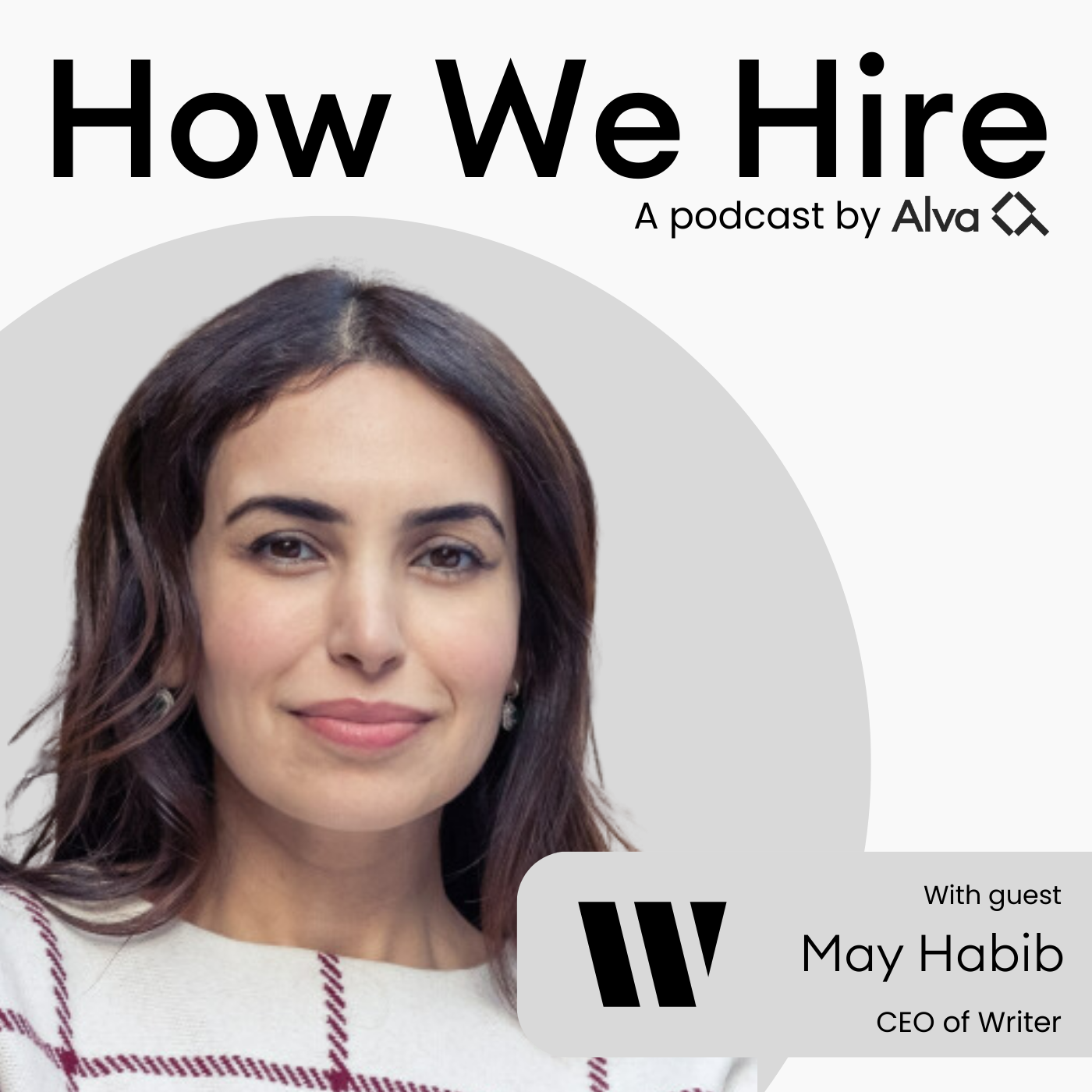How We Hire Podcast Episode 27 Transcript
Speaker 1 (00:00):
Most jobs in the world will change and 30 to 40% of them will change dramatically. I think we will be supervising models that do most of our work in those jobs that change most dramatically. So writing positions, analyst positions, marketing positions. Our role will be the creativity and the spark, and I think the keep the lights on work will be done automatically.
Speaker 2 (00:30):
Welcome to How We Hire a podcast by Alva Labs with me, Linnea, licensed psychologist and head of people. This show is for all of you who hire or just find recruitment interesting. In every episode, I will speak with thought leaders from across the globe to learn from their experiences and best practices within hiring, building teams and growing organizations. Our
Speaker 3 (00:58):
Guest on today's episode is May Habib, the co-founder and c e o of writer, an AI writing assistant for teams that has recently named to be on the Forbes AI 50 list. Her academic roots lie in Harvard and her active contribution to the World Economic Forum and the Aspen Global Leadership Network are just testaments to her standing in the technology sphere with Mae's deep rooted passion for innovation and her commitment to meaningful advancements within ai. I'm thrilled to invite you to listen to our conversation that will hopefully inspire you to reimagine the future work and the transformation potential of technology. Welcome to How we hire Mei.
Speaker 1 (01:39):
Thank you. Thanks for having me.
Speaker 3 (01:41):
It's a pleasure. Obviously we will dive into the topic of AI linking that to hiring, but before we dive into that pool, can you please tell us a little bit about your background? What led you to co-founding at writer and what's it like being c e o of a generative AI startup?
Speaker 1 (02:02):
Yeah, great questions all. I have been in the natural language processing space very broadly for almost 10 years. My first company with my co-founder was a machine translation company, and so what we were trying to do was greatly improve the capacity of the world to reduce language as a barrier. It definitely was very personal for both of us. I immigrated to Canada from Lebanon and learned English as a young girl, taught it to lots of members of my family, interpreted for lots of people over intervening years, and my co-founder taught himself English at 20 as a computer science student in Syria, and that was a really important mission for us. While building the company was called Cordoba. While building Cordoba, we really had I think a unfair advantage that has proved to be pretty critical in why and how we built writer. The first is we got really early hands-on access to transformers because a lot of the underlying technology that we use today for generative AI got its roots in research, in machine translation problems.
(03:24):
The second thing is as we built out an enterprise SaaS offering on top of our machine translation technology, we got to see a really incredible cross-section of how content got written across a company. And when you are in machine translation or localization as the industry is called, you get to see how a company takes its entire offering into say Japanese or German or French. And so we got this real masterclass in a deep one across the cross-functional workflows that use and require words. And so we put that together to launch writer in early 2020. A lot of those ideas had been germinating for a lot of 2019, and the central premise was could we use translation technology to translate bad English to good English off-brand English to on-brand English because there were so many problems that we saw in this cross functional view of a user journey.
(04:28):
So a very interesting, I think, set of experiences that led us to writer. Writer is a generative AI platform for the enterprise. And so rather than having 50 tools across 10 functions and hundreds of teams all accessing and using large language models for kind of spot solutions, we give enterprises a single secure platform to build many generative AI applications off of a single model that they can host, they can inspect, they can see the data that has gone into it, and the UI that they have is really user friendly. So think of it as kind of UI building blocks to be able to build any generative AI application across the business. We put that together with a set of features that takes a company's own data and marries it to a large language model. So a lot of the weaknesses of large languages, language models, they make shit up. They don't actually know what they're talking about. It is fake news. Those problems we really put to bed with the way that we've architected it.
Speaker 3 (05:36):
Fantastic. And I think what are you as a founder most proud of that you and your team has accomplished with Ryder?
Speaker 1 (05:45):
Good question. I really like the idea that I do think this is long-term true, that people are the only enduring competitive advantage. Everything else can and I think will be in a way with time and money because it can be inspected and copied. What is really, really hard to understand, especially from the outside, is how a company gets shit done, how a team gets shit done, how people are productive and how they are collaborative and how they are creative. And the culture in which I think we have grown up in is and that we are scaling now is a culture that has no preconceived notions about things. And I live my own life this way. I'm just realizing that now as I speak this out loud. And I think me and my co-founder both bring it to the company, which is why it's like this. And we've hired and recruited incredible people who are first principals thinkers as well. So I would say that is the thing I'm most proud of. It's probably why I'm on the show and why your premise spoke to me that as cliche as it sounds like the people make the place. Absolutely. And that's what I'm most proud of.
Speaker 3 (06:54):
What a fantastic answer. And when you just say when the first principle people, what is that?
Speaker 1 (06:59):
Oh, interesting. Yeah. The folks who their experiences shape them, they learn incredibly deep lessons from things that went well, things that didn't go well, but that's just context. They start looking at every problem with a fresh mind and build up solutions based on the problem at hand, informed by their experience, but not a playbook that they're here to just copy and paste because this is a new market developing at a very different speed. AI touching the quote front office if you will. Buyers who have never bought this type of technology before, end users who are hanging on for dear life. There is just, we cannot afford to have playbook thinkers in the company right now. And I think the culture of the place really does attract the opposite.
Speaker 3 (07:49):
So I mean this podcast is obviously aimed at dissecting the talent acquisition space and the buzzword in hiring recruitment right now is obviously generative ai. How do you envision the evolution? How will it reshape recruitment strategies?
Speaker 1 (08:10):
Yep. I think it's a couple of things. It's the thing that you probably expect me to say around the recruiting tools and the messaging and the discovery and all of that, how we make existing workflow processes faster, more efficient, more skilled. I think there is a potentially bigger revolution to happen in terms of the type of employees we look for regardless of the role and their expectations around how they'll be expected to do their job and what tooling is available for them to do their job. And so from what employers I think are going to be looking for are employees with a lot of experiencing leveraging up their day-to-day with automations that they seek out and build themselves. And I think the employer employees in turn are going to be looking for workplaces that encourage this type of automation and are literate about it in terms of being able to understand that and have confidence around the expertise that an AI enabled employee can bring about when and how to use AI in ways that protect the company, protect its data, don't introduce new sources of risk, et cetera. So I think there's a coming raising of the table stakes on both sides around what is attractive and who is attractive.
Speaker 3 (09:47):
It's both about how we actually do the craftsmanship of hiring where it sounds like automation and making it more both personalized but also faster and the way we work. But the big shift is more how we view talent, how talent view the workplace.
Speaker 1 (10:06):
Oh yeah, I think so. And we saw a lot of that with even just Gen Z, starting to enter the workplace around communication and messaging and help me interpret this text that I just got from our 22 year old intern type of memes. And we certainly did some content around that actually, the various styles of communication. We did a very interesting survey three years ago about that because we are a tool that sits at people's fingertips deciding how we want to sound, what our culture is, what language is going to be okay and not okay. These were things that folks were really excited about. I think we're going to get back to that conversation right now. People only care about one thing. How do I blurt out tons of sentences at once? I think we're going to go back to the folks once the newness of that has died down, people will care much more about, again, the letter by letter, how am I coming across side of things? That's definitely a sidebar and a digression to your question around what employees will be looking for. I think they will want to feel like the AI skills they bring are welcome and valued and not feared and disdained.
Speaker 3 (11:24):
So in your conversations with other CEOs, what are your takeaways regarding the shift towards AI and hiring?
Speaker 1 (11:33):
Well, Lanaya, it's not anything good right now, honestly. Oh, really?
(11:37):
Well, I feel like there are a lot of people who business line of business owners, CMOs, CIOs, where one of the first things they tell me is at a senior level, my executive wants to understand we can use AI to cut 10 or 15% more people. So to me, if it's folks who would've been, we have not yet reached the bottom of this downturn, they are folks who would've anyway been up for a rif for example. I see sort of the races on for companies like us to make sure that we help employees really show up in ways that put their best foot forward. And we did a round table with some of our customer power users the other day and one of the participants said that using writer was like somebody bringing donuts to the office and you literally eat all the donuts. He really felt like, and it was so great, and we've heard similar types of reactions before.
(12:43):
The people who really glove on really feel like it gives them a leg up or gives them a leg up. We've had customers tell us that their users who don't have English as a second language feel like it is an equalizing power. And these are reasons me and Wasim started our entrepreneurial journey. So it's really meaningful to me to hear that we've got customers in the enterprise for whom writer is even part of A D E I initiative because of how it puts everybody on an equal foot in terms of communication and being able to be productive even when English is not their first language. So there's a lot to love about what is coming. Absolutely. And I think with more time and with this technology being in market for longer, we are a three-year-old company and we kind of saw what was going to happen on the consumer side and we're just much more excited about building ahead on the enterprise.
(13:40):
I do think that people who are seeing this for the first time now still are getting, you need to get a lot more comfortable with it, I think before the real issues emerge. What do you mean with that? I mean that our customers who are two or three years in with Ryder haven't cut 15% of their workforce as a result come to expect a much higher level of productivity from certain types of jobs on certain types of teams. They've been able to be very comfortable with their level of staffing even as their goals and ambitions increase. So I would say it would be interesting, I'd love to look at this internally actually. I don't feel like a lot of our customers have Rift and we've got customers that are on the SS M B side for sure, but I mean our account managed customers, the hundreds of customers in the mid-market and enterprise, especially the teams that we have worked with, I would say literally gun ahead, maybe 10 to 15% have seen a haircut of 10 to 15% of their workforces of the teams that we work with. But it is really a minority in a small number. So I think the more mature the AI adoption is, the further away executives are from the idea that this is a head cutting power.
Speaker 3 (14:58):
So it's more increasing quality, increasing speed with a fantastic team that you hopefully have rather than reducing headcount for the sake of reducing headcount.
Speaker 1 (15:09):
Yeah, totally. And it might be future forward headcount reduction or headcount avoidance as a result of being able to do things leveraged up, but I think most people would rather give more responsibility to existing employees who are already trusted than need to go out there and hire and bring folks in and the ramp and everything that entails. So I think that's what's happening.
Speaker 3 (15:33):
And I mean Alva is a happy rider customer and have been so for some time, but we're still not using it in hiring. So would love, do you know if any of your customers have or are planning to are saying rider in their hiring, and if so, how?
Speaker 1 (15:48):
Yeah, we definitely do. We've got customers on the enterprise side who will produce more content in a hiring process than most companies produce on the marketing side because they have tens of thousands of open REX a year. And the pipeline to maintain and nurture people who have entered or dropped out or are currently in a hiring process is tremendous. There's certainly the email communication and the sequencing of all of that communication. Then there is the content and context of what you send them. So we have these thought leadership pieces on sustainability to somebody who you want to join your sustainability practice. We have published this on biotech innovation to academic who you want to come over to the private sector. So there is a lot of content work there. And then on the research and analysis part of our product that people are using writer to do everything from parse through candidate experience survey results to understand what competitors are doing on the hiring front to evaluating job descriptions for bias and brand. So there is quite a bit of incredible use cases that are emerging with hiring teams.
Speaker 3 (17:16):
And I think it's so interesting how TA functions and marketing functions. It's all like take your marketeer and go hand in hand with them so that you can leverage your employer branding and include that in your hiring. So rider could kind of be that marketeer that you will then have in your team and it can help you with that content. I think that's a really nice use case. If we move on to I guess a topic that's very top of mind for a lot of organizations right now, which is the European Commission proposing the ai. In your mind, how do you see regulations shaping the role of ai, particularly in hiring?
Speaker 1 (17:57):
Yeah, I welcome the regulation. I do think it is really important for companies to be forced to certify what their models can and can't do. The data that has gone into training them, any potential copyright issues that are future forward risks that companies who are using the models end up ascribing to, et cetera. So I do think it's important. We don't want so much regulation that it's stifles new innovation and we're a startup as well where we're kind of in this interesting place where we've got our models and our pipelines for building additional ones. And so in a lot of ways we've benefited from this very open unregulated period. We're certainly though small enough to not want the drawbridge to be brought up after us. And I think a lot of the big tech regulation pushes are absolutely self-serving, right? We did not see this level of calls for regulation on social media, and I would argue social media is still much more harmful to social cohesion and childhood development and all sorts of things that have been disrupted and changed by social media in ways that I don't think ai, when we write the story on the last 50 years of innovation in 2050, I don't think AI risk will be seen at the same level as what social media risk was truly.
Speaker 3 (19:27):
And why then is AI treated differently? Why is there more eyes on it, more conversation around the risk than it has been around social media?
Speaker 1 (19:37):
Yeah, I think the public imagination about what AI could do, right? I love this comic. I saw somewhere of the Roomba vacuum being taken over by AI and eating. Its owner Twitter can't eat its owner, right? There's these social media platforms are not, they don't have the risk of this self autonomy that AI has and certainly the way in which technology, AI technology is accelerating because of ai. We use our own models in pretty fascinating ways internally to be able to develop product faster. And so I do think there's this compounding advantage and this acceleration, the rate of change is changing faster accelerate that I think scares people when they draw it out. But I think what they are not including in that is our incredible set of AI safety researchers whose work is just in a continual basis being integrated into the model. So yes, the risk is there and human ingenuity is incredible power and I think is making pace with the tech,
Speaker 3 (20:47):
Right? So it's too many will Smith apocalypse movies that creates the fear.
Speaker 1 (20:53):
Yes, exactly. Yes.
Speaker 3 (20:55):
But I mean, speaking of this, because I think one thing that we have discussed a lot, I mean previously to this now explosion of AI discussion is diversity and fairness and inclusivity in hiring. And I think that has now become a discussion of can AI make or break diversity in hiring? What's your thoughts on that?
Speaker 1 (21:17):
There's no question that the models reflect the biases of society and the writer models. We've mitigated a lot and we've got a roadmap to mitigate even more. But the best mitigation for your content and L l M output to not be biased is using a writer's inclusivity features, which are basically ML rules that sit on top of the model, but also people who are trained to recognize what bias looks like when it appears in communication and brand content including employer content and recruiting content. So there's no substitution for, I think the road that a lot of companies were on around D E I and training and the real focus we all put on it a couple years ago now nobody talks about it at all. It feels like such a missed opportunity for lasting change. I wish someone would do a comparison and shame the brands that we're all about Black Lives Matter and Pro B L M and what has actually happened in intervening two or three years in terms of their hiring practices.
(22:28):
So we ourselves are publishing this week actually a diversity dashboard. It's in honor of pride, but includes all sorts of metrics about our workforce that we're almost a hundred people that I would like us to be tracking on a quarterly basis moving forward. And it's so funny, if you had asked me what percentage of the employee base at Ryder is non-white, I would've said 50 ish, but it's actually 45, right? Low forties, maybe not even quite 45. If you had asked me what percentage of writer identifies as women or non-binary or gender fluid, I would've said 50%. Nope, it's 40, right? If you had said, how many people don't have English as a second language? I'm like, fucking everybody. No, it's 35%. And so all of these mental things that I had about mental ideas, I had about writer as a 20 to 30 person company, which we were for most of our life are no longer true at almost a hundred people.
(23:33):
And it's like, holy shit, we really have to redouble our efforts. And I think the level of the reversion on some of those metrics that we saw from 30 people to tripling I think is certainly a lot tighter than my guess would be about other companies. But it doesn't matter. We're not other companies. I really want to have a company that is off the charts diverse, reflecting the diversity of the world. So yeah, lots to unpack there, but I think there are a lot of jobs to be done here that have nothing to do with AI still.
Speaker 3 (24:07):
Yeah, I think that makes sense. What I take with me from your answer is on one side, AI can help when the models are trained on the right type of data and used in the right way as with everything. But there's also a lot of aspects that aren't linked to AI that needs full attention when it comes to diversity and inclusion.
Speaker 1 (24:29):
Totally. Okay.
Speaker 3 (24:30):
So I mean, we've danced around the topic a little bit, but you started saying what type of people that you have hired for writer, but with this now rapid movement within your industry, but now all companies with generative ai, what do you look for? What do other companies need to look for when it comes to competencies, soft skills?
Speaker 1 (24:53):
The steepness of the learning curve I think is a really important one because the people who can be constantly learning are the folks who are going to be able to make the most of just this real, really accelerating AI tool landscape. I think the other thing that comes with a steep learning curve, I think it's pretty tied to it. I don't know that you can have a steep learning curve if you're not very good at asking questions. And what's great about AI is you don't have to know a lot of answers. You need to know how to be a really good person who asks questions. So if I, for example, wanted, let's take a very simple example. I wanted to write a headline that just absolutely busts through this conversion rate ceiling I'm seeing. And I could say something to AI very simply, like let's say this is a, the H one on your employer page of why you need to apply for a job at writer or at all labs, and you ask writer to give you headline suggestions or any AI tool.
(26:03):
If you instead say, go down a series of questions around what is the psychology on top talent applying for jobs and dig in, dig in, dig in until you get to a, not just an H one that sounds better than the one you've got, but one that is really grounded in conversion science for this particular audience that you care about making a change. It's so different. And it starts with knowing what questions to ask and having that curiosity. So I do think that it's going to get harder to screen for that. Maybe it's correlated with an IQ test, but most places are not. We still do actually an assessment and it's personality as much as it is cognitive, just to really understand how somebody is coming across an interview and how they show up in something more standardized. And it is part of our candidate experience and it's a factor. It's not, it doesn't hold ETO power by any means. So yeah. Does that answer your question?
Speaker 3 (27:08):
It definitely does. And I think what you say is that you need to find that skill, the learning curve, the capacity to ask the right questions, and I guess to use the knowledge that you can get from others in a good way. And the way that you can assess that is it sounded like in several different steps, because that was kind of my follow-up question. How do you know that you have one of those candidates in front of you?
Speaker 1 (27:32):
The assessments I think is hard. I think for the next six months, what I would be maybe even the next quarter, six months is a long time. I think I would ask, and obviously we ask because people are applying to a generative AI company, but what is your level of familiarity with AI tools? What have you been experimenting with? What have you tried? What was the policy at your old company? I think those are great questions to get a sense of whether somebody is leaning in and at least curious. And if those questions are all highly negative, I would take that as a flag right now. I really would across all roles.
Speaker 3 (28:05):
That's a good concrete example of how you can investigate curiosity in your case, relate to AI obviously. And maybe that's something that more companies should actually steal with pride, but it could also be other aspects that are more relevant for them or something like that. I think that's something that people can still, because I guess the next question, something that we've talked a lot about internally is how do we really make sure that all employees leverage the use of ai, not use it for the sake of using it, really getting helped by it. So in your mind, how do people leaders ensure that their organization is upskilling are taking advantage of the possibilities now?
Speaker 1 (28:49):
Yeah, the learning starts when you start reach out to us. I'm May at writer. There are a lot of companies out there for sure. I think we've got a really differentiated approach and can help people connect with others who look like them around these topics. The most important thing is to not be paralyzed with fear or with strategy, like the work about work about ai, the generative AI task force, leave that to the bigger companies. I think for this audience really starting to explore is important and chat J P T will get you a really long way. And when you need more, when you need consistency, when you need a collaborative approach, get in touch with writer.
Speaker 3 (29:36):
That's great. I think we do in a conversation around ai, we have to at least tap into the area of what roles will live on and what roles will not be needed moving forward. Is there an answer to that question?
Speaker 1 (29:52):
Not needed is strong, but I do think most jobs in the world will change and 30 to 40% of them will change dramatically.
Speaker 3 (30:01):
And in what way?
Speaker 1 (30:02):
I think we will be supervising models that do most of our work in those jobs that change most dramatically. So writing positions, analyst positions, marketing positions. Our role will be the creativity and the spark, and I think the keep the lights on work will be done automatically.
Speaker 3 (30:23):
Because one thing that you've mentioned on LinkedIn is that AI won't replace human insight or intelligence. Do you mind elaborating a little bit what you meant with that?
Speaker 1 (30:34):
Yeah. So much of what makes something good is the novelty of it, and not novelty for uniqueness sake, but something that pushes a whole field forward and the communities on the novelty or the joke. And I think that when that breakthrough comes from a human versus a machine, we will care. That's not the same as we can tell, but we will care. And I don't think that goes away. I think our level of sophistication around what we value goes up.
Speaker 3 (31:13):
And one final question to wrap things up before I let you go ask someone with a profile within generative ai, what are some of the misconceptions when it comes to AI within talent acquisition that you would like to address?
Speaker 1 (31:30):
Yeah, I think the first thing I'd love to say is that the idea that AI is going to make us all sound the same or it homogenizes communication or it takes the heart out of it. I don't see that true. And certainly the HR teams we work with, the recruiting teams that are using writer, these are some of the world's best recruiting teams in the world, and I just don't see their use cases around automation or giving them the time to create a much more human candidate experience. And I think that the second misconception is around bias and exclusion, and that one's a harder one because there's a lot of truth there around who can be excluded and who will be excluded if we don't as an industry really make sure that we're addressing bias. But I also think that what we're seeing is the power of AI to encourage inclusion. People who have a D H D people who are dyslexic, people whose English is not their first language, they are just as capable of contributing the ideas and the projects that move the company forward, but may not be able to sit there for 14 hours and type it all up. Right? There are a lot of ways that contribution can be assessed, and I think one of those ways in terms of just sheer writing ability, that's being democratized by ai and I think that's a good thing.
Speaker 3 (32:58):
Yeah. Let's use that as an ending note. I will now go ask my marketing team for access to writer so we can start working magic in our candidate experience and employer branding work. Thank you so much for joining How We Hire. It was an absolute pleasure. Take care and hope to speak to you again.
Speaker 1 (33:15):
Thank you so much, Lynette. Likewise. Talk soon.
Speaker 3 (33:18):
Talk soon.





